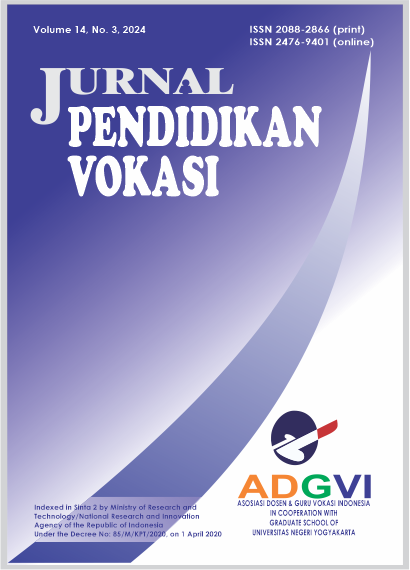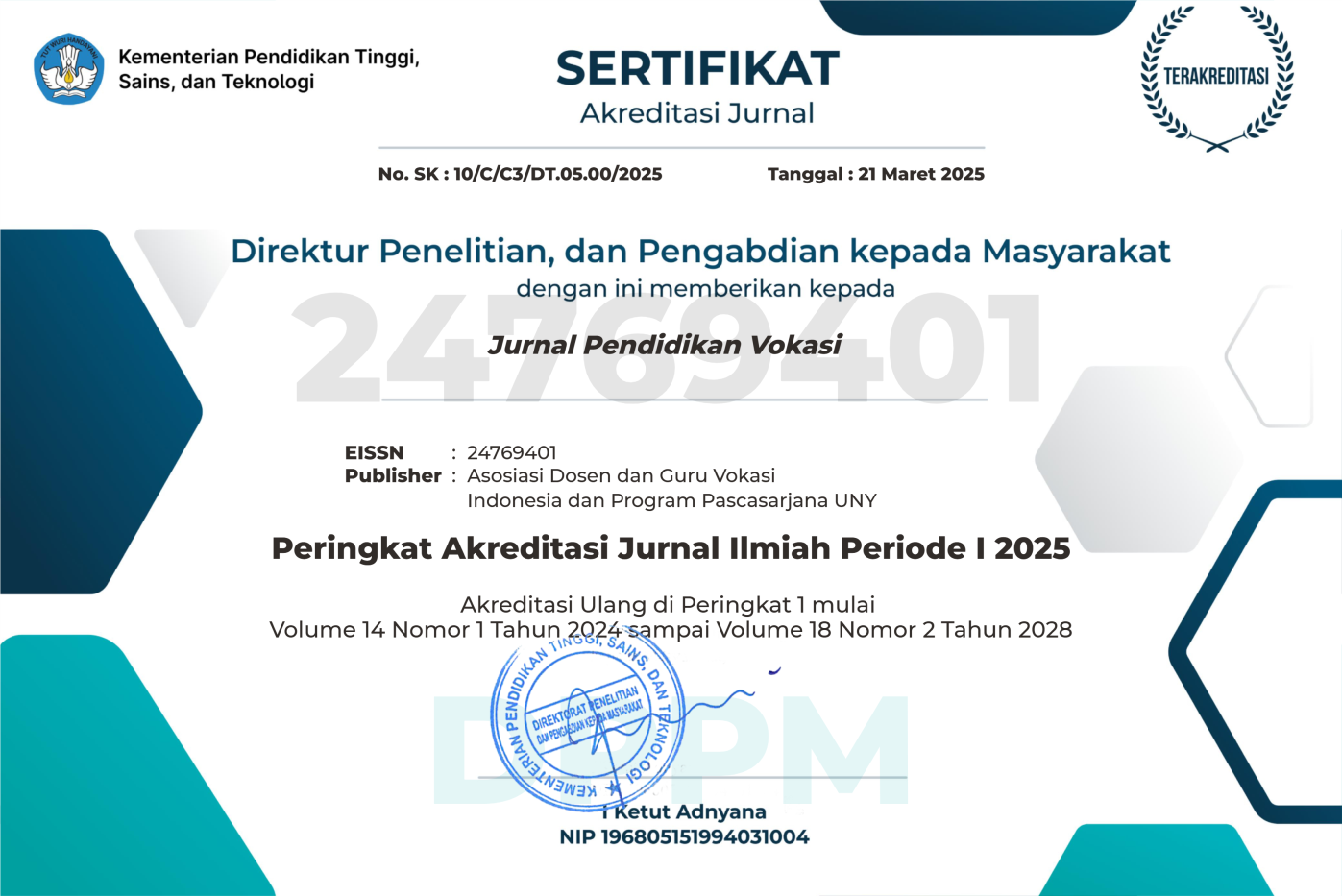Characteristics and aspiration of entrepreneurship among student teachers of Teacher Education Institute, Technical Education Campus (IPGKPT)
DOI:
https://doi.org/10.21831/jpv.v14i3.77866Keywords:
Entrepreneurship education, Entrepreneurial characteristics, Entrepreneurial aspirations, Student teachers, Teacher Education Institute (IPGKPT), Quantitative surveyAbstract
Entrepreneurship education programmes have been expanded globally across multiple levels of education to foster entrepreneurial competencies, including among student teachers at the Technical Education Campus, Teacher Education Institute (IPGKPT). Despite this development, limited studies have examined the entrepreneurial mindset of future teachers, who play a crucial role in shaping the next generation. This study aims to identify the entrepreneurial characteristics and the level of entrepreneurial aspirations among IPGKPT student teachers. A descriptive quantitative survey design was employed, involving 498 student teachers who responded to a Likert-scale questionnaire distributed via Google Forms. The results indicated that entrepreneurial characteristics (M = 3.78, SD = 0.85) and entrepreneurial aspirations (M = 3.76, SD = 0.85) were both at a high level. The findings further showed that student teachers demonstrated strong traits in risk-taking, innovativeness, and locus of control, as well as high levels of achievement motivation and self-efficacy. These results suggest that student teachers at IPGKPT are well-prepared to embrace entrepreneurship education and may potentially become role models in fostering entrepreneurial culture in schools. The study highlights the importance of sustaining and strengthening entrepreneurship education programmes in higher education institutions, particularly in teacher training colleges, to equip future educators with entrepreneurial mindsets and competencies. Such initiatives are expected to enhance graduate employability, encourage innovation in teaching, and contribute to broader national efforts toward economic growth and sustainability.
References
Abu, B., Johan, O. M., Mansor, S. M. S. S., & Jaafar, H. (2007). Kepelbagaian gaya pembelajaran dan kemahiran belajar pelajar universiti di Fakulti Pendidikan UTM Johor. https://www.academia.edu/download/6522617/71881.pdf
Antoncic, J. A., Antoncic, B., Gantar, M., Hisrich, R. D., Marks, L. J., Bachkirov, A. A., Li, Z., Polzin, P., Borges, J. L., Coelho, A., & Kakkonen, M.-L. (2018). Risk-taking propensity and entrepreneurship: The role of power distance. Journal of Enterprising Culture, 26(1), 1–26. https://doi.org/10.1142/S0218495818500012
Anwar, I., & Saleem, I. (2019). Exploring entrepreneurial characteristics among university students: An evidence from India. Asia Pacific Journal of Innovation and Entrepreneurship, 13(3), 282–295. https://doi.org/10.1108/APJIE-07-2018-0044
Bagheri, A., Alinezhad, A., & Sajadi, S. M. (2019). Gamification in higher education: Implications to improve entrepreneurship education. Proceedings of the 12th European Conference on Game Based Learning, 48–57. https://doi.org/10.34190/GBL.19.062
Bailetti, T. (2012). Technology entrepreneurship: Overview, definition, and distinctive aspects. Technology Innovation Management Review, 2(2), 5–12. https://doi.org/10.22215/timreview/520
Bisanz, A., Hueber, S., Lindner, J., & Jambor, E. (2019). Social entrepreneurship education in primary school: Empowering each child with the youth start entrepreneurial challenges programme. Discourse and Communication for Sustainable Education, 10(2), 142–156. https://doi.org/10.2478/dcse-2019-0024
Blenker, P., Korsgaard, S., Neergaard, H., & Thrane, C. (2011). The questions we care about: Paradigms and progression in entrepreneurship education. Industry and Higher Education, 25(6), 417–427. https://doi.org/10.5367/ihe.2011.0065
Chalkiadaki, A. (2018). A systematic literature review of 21st century skills and competencies in primary education. International Journal of Instruction, 11(3), 1–16. https://doi.org/10.12973/iji.2018.1131a
Chua, Y. P. (2012). Mastering research methods (2nd ed.). Mcgraw-Hill Education.
Cohen, L., Manion, L., & Morrison, K. (2017). Research methods in education (8th ed.). Routledge. https://doi.org/10.4324/9781315456539
Dodgson, M., & Gann, D. (2010). Joseph Schumpeter’s gales of creative destruction. In Innovation (pp. 12–30). Oxford University Press. https://doi.org/10.1093/actrade/9780199568901.003.0002
Fadzil, Z. (2013). Pengaruh faktor demografi, lokus kawalan dan stail berfikir terhadap personaliti usahawan berjaya berdasarkan Teori Kerjaya Holland [Universiti Sains Malaysia]. https://www.academia.edu/download/92215326/32601002.pdf
Foong, S. Z. Y., Lam, Y. L., Andiappan, V., Foo, D. C. Y., & Ng, D. K. S. (2018). A systematic approach for the synthesis and optimization of palm oil milling processes. Industrial & Engineering Chemistry Research, 57(8), 2945–2955. https://doi.org/10.1021/acs.iecr.7b04788
Ghafar, M. N. A. (1999). Penyelidikan Pendidikan. Penerbit Universiti Teknologi Malaysia.
Hamzah, M. I. M., Juraime, F., & Mansor, A. N. (2016). Malaysian principals’ technology leadership practices and curriculum management. Creative Education, 7(7). https://www.scirp.org/reference/referencespapers?referenceid=1760613
Ismail, A. D., Ja’far, J., Buang, N. A., & Othman, N. (2021). Kecenderungan keusahawanan terhadap aspirasi kerjaya keusahawanan atas talian dalam kalangan pelajar tingkatan 6. Malaysian Journal of Social Sciences and Humanities (MJSSH), 6(2), 9–21. https://doi.org/10.47405/mjssh.v6i2.646
Mahmud, M., Zarith, S. M., Hamzah, R., & Udin, A. (2011). Keusahawanan dalam Pendidikan Teknik dan Vokasional (PTV) di Malaysia. Journal of Edupres, 1, 2019–2213. http://eprints.utm.my/17065/1/JOE-1-2011-026.pdf
Mohamad, R., & Othman, N. (2018). Korelasi efikasi kendiri keusahawanan dan kecenderungan keusahawanan pelajar pra-universiti. Akademika, 88(2), 59–70. https://www.academia.edu/download/116322828/196236815.pdf
Moidunny, K. (2009). The effectiveness of the National Professional Qualification for Educational Leaders (NPQEL) [The National University of Malaysia]. https://www.scirp.org/reference/referencespapers?referenceid=1760613
Nasharudin, N., & Harun, H. (2010). Aspirasi kerjaya keusahawanan dalam kalangan pelajar institusi pengajian tinggi awam. Jurnal Pendidikan Malaysia, 35(1), 11–17. https://www.academia.edu/download/31196593/a.pdf
Nasir, S. M. (2014). Ciri-ciri keusahawanan dalam kalangan guru pelatih. Personalia Pelajar, 17(1), 1–8. https://doi.org/10.17576/personalia.1701.2014.11
Nurdin, G., Chan, K. L. G., Selvadurai, S., & Ishak, S. (2014). Hubungan sosial dan perniagaan kecil-kecilan di Malaysia-Tingkah laku inovatif usahawan wanita atas talian. Malaysia Journal of Society and Space, 10(6), 206–216. https://core.ac.uk/download/pdf/33343837.pdf
Obi, B. I. N., Eze, T. I., & Chibuzo, N. F. (2022). Experiential learning activities in business education for developing 21st century competencies. Journal of Education for Business, 97(1), 36–42. https://doi.org/10.1080/08832323.2021.1884521
Ratinho, T., Harms, R., & Walsh, S. (2015). Structuring the technology entrepreneurship publication landscape: Making sense out of chaos. Technological Forecasting and Social Change, 100, 168–175. https://doi.org/10.1016/j.techfore.2015.05.004
Seth, K. P. (2020). The impact of entrepreneurship education on entrepreneurial intention: An empirical study of entrepreneurship education’s four key characteristics [Brunel University London]. https://bura.brunel.ac.uk/handle/2438/20368
Taherdoost, H. (2022). Measurement and scaling techniques in research methodology; Survey / questionnaire development. International Journal of Academic Research in Management, 6(1), 1–5. https://papers.ssrn.com/sol3/papers.cfm?abstract_id=4178691
Thomas, S. E. (2019). Impact of Network for Teaching Entrepreneurship (NfTE) entrepreneurship education [Trident University International]. https://www.proquest.com/openview/04cfb19ba1a410b7e1fba23fefd530ef/1?pq-origsite=gscholar&cbl=51922&diss=y
Thompson, S. (2006). Anger and the struggle for justice. In Emotion, Politics and Society (pp. 123–144). Palgrave Macmillan UK. https://doi.org/10.1057/9780230627895_8
Timmermans, A. N. (2022). Preparing undergraduate students for lifelong learning: Lessons learned from entrepreneurship education [Northumbria University]. https://www.proquest.com/openview/02b85cdd2b32151dee11ca43e6f15f3f/1?cbl=2026366&diss=y&pq-origsite=gscholar
Toscher, B. (2020). Blank canvas: Explorative behavior and personal agency in arts entrepreneurship education. Artivate: A Journal of Entrepreneurship in the Arts, 9(2), 19–44. https://doi.org/10.34053/artivate.9.2.115
Wach, K., & Głodowska, A. (2021). How do demographics and basic traits of an entrepreneur impact the internationalization of firms? Oeconomia Copernicana, 12(2), 399–424. https://doi.org/10.24136/oc.2021.014
Yordanova, D. (2020). Bulgarian nascent student technopreneurs: Motives, perceptions of barriers and startup activities. International Journal of Multidisciplinarity in Business & Science (IJMBS), 6(10). https://search.ebscohost.com/login.aspx?direct=true&profile=ehost&scope=site&authtype=crawler&jrnl=18490581&AN=149484625&h=WpIM6h0YStP%2BfHfEVGcCfw%2BEEiqH%2FIA0rfsv806Q54p49N%2BbU3NW1%2BeoTYPntiV6suDXBtvRdAd%2FEvSBNwwGvw%3D%3D&crl=c
Zhou, Y., Li, H., & Shahzad, F. (2021). Does college education promote entrepreneurship education in China? Sage Open, 11(3). https://doi.org/10.1177/21582440211031616
Published
How to Cite
Issue
Section
Citation Check
License
Copyright (c) 2025 Jurnal Pendidikan Vokasi

This work is licensed under a Creative Commons Attribution-ShareAlike 4.0 International License.
The authors submitting a manuscript to this journal agree that, if accepted for publication, copyright publishing of the submission shall be assigned to Jurnal Pendidikan Vokasi. However, even though the journal asks for a copyright transfer, the authors retain (or are granted back) significant scholarly rights.
The copyright transfer agreement form can be downloaded here: [JPV Copyright Transfer Agreement Form]
The copyright form should be signed originally and sent to the Editorial Office through email to jpvokasi@uny.ac.id
Jurnal Pendidikan Vokasi by http://journal.uny.ac.id/index.php/jpv is licensed under a Creative Commons Attribution-ShareAlike 4.0 International License.













